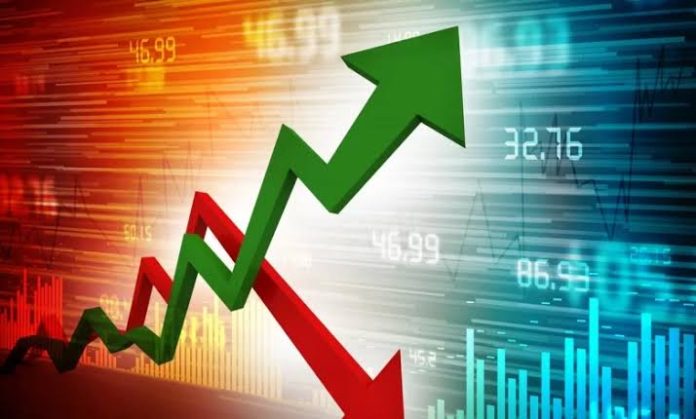Equity market investors on Monday started the week on a positive note with a gain of N34 billion from investing in stocks on the Nigerian Exchange Limited as the nation’s economy recorded growth.
The National Bureau of Statistics disclosed on Monday that Nigeria’s economy expanded by 3.19 percent in Q2 2024, up from 2.51 percent in Q2 2023 and surpassing the 2.98 percent growth of Q1 2024.
The Services sector played a pivotal role, growing by 3.79 percent and contributing 58.76 percent to the total GDP, driving overall economic performance.
This gain recorded by investors was accompanied by a favourable market breadth, as 28 stocks advanced while 18 declined, pushing the year-to-date return to an impressive 28.44 percent.
Market capitalisation followed suit, climbing by 0.07 percent to reach N55.17 trillion, translating to a gain of approximately N37 billion for investors.
Sectoral performance was predominantly bullish, with the Consumer Goods sector leading the pack with a 1.83 percent gain.
The Insurance sector saw a robust 1.05 percent increase, and the Oil/Gas and Industrial Goods sectors recorded modest gains of 0.73 percent and 0.01 percent, respectively. The Banking sector was the only one to slip, falling by 0.41 percent, primarily due to a decline in ACCESSCORP’s share price.
Notable gainers included ETERNA, which surged by 10.00%, OKOMUOIL by 9.99 percent, RTBRISCOE by 9.96 percent, OANDO by 9.93 percent, and JAPAULGOLD by 9.73 percent. The market maintained its bullish stance with increased trading activity, as the number of deals and trading volume surged by 25.72 percent and 19.32 percent, reaching 9,242 deals and 390.51 million units.
However, the traded value saw a decline of 15.73 percent, closing at N3.88 billion. VERITASKAP emerged as the most traded stock by volume, with 67.27 million units exchanged in 212 deals.
In the money market, NIBOR rates continued to decline across tenors, reflecting sufficient system liquidity. The Overnight NIBOR notably dropped by 263bps to 23.33 percent on Monday, as banks with excess liquidity sought lower borrowing rates.
Likewise, key money market rates such as the Open Repo Rate (OPR) and Overnight Rate (O/N) decreased by 81bps and 67bps to conclude at 24.97 percent and 25.50 percent, respectively.
The Nigerian Interbank Treasury Bills True Yield (NITTY) saw declines across most maturities. NITTY fell by 17bps, 45bps, and 77bps, for the 1-month, 3-month, and 12-month periods. The secondary market for Nigerian Treasury Bills experienced bullish momentum, resulting in a 0.26 percent decrease in the average yield, bringing it down to 19.73 percent.
In the secondary market for FGN Bonds, trading activity pointed towards bullish sentiment, with the average yield decreasing by 7bps to close at 19.55 percent. In the Nigerian sovereign Eurobonds market, positive sentiment across segments of the yield curve led to a decrease in the average yield by 0.06 percent to 10.07 percent.
At the official NAFEM market, the naira depreciated by 1.69 percent, closing at ₦1,596.60 per US dollar. In the parallel market, the naira depreciated by 0.31 percent to close at ₦1,605 per dollar.

